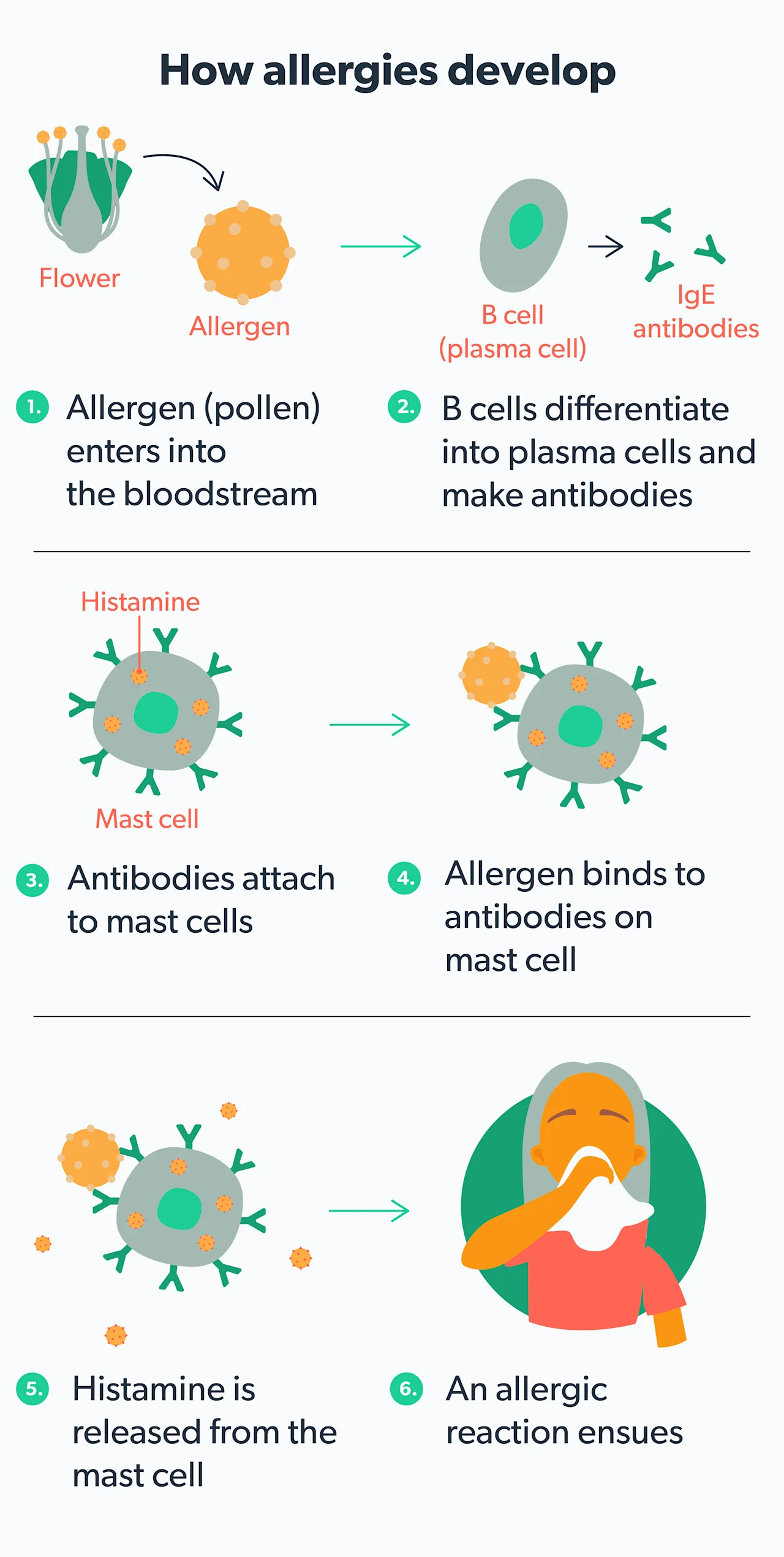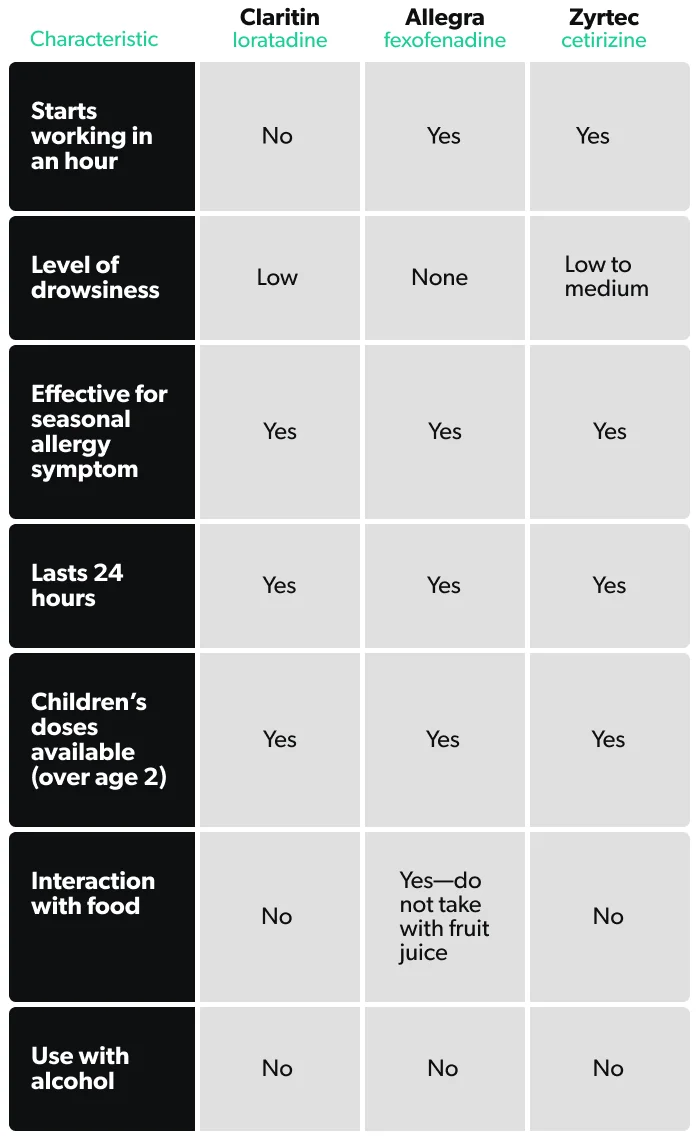Here's what we'll cover
Here's what we'll cover
Here's what we'll cover
Seasonal allergies cause misery for millions of people each year. Whether you deal with a constant dripping nose, puffy eyes, or an itchy throat, you’ve probably looked high and low for solutions.
In the past, the primary option was Benadryl, an antihistamine that could make you feel very sleepy. Now, we have newer antihistamines that promise relief without sedating you. Read on to learn how to compare Allegra vs. Claritin vs. Zyrtec for allergy relief.
What are antihistamines?
Claritin, Allegra, and Zyrtec all belong to a class of medication known as antihistamines. These medications are mainly used to treat allergies, including seasonal allergies or hay fever (allergic rhinitis).
When your body has an allergic reaction to allergens (pollen, ragweed, pet dander, etc.), your immune system releases a chemical messenger called histamine. Histamine binds to specific immune cells and triggers the classic allergy symptoms of itching, runny nose, sneezing, etc. Antihistamines prevent histamine from attaching to the cells and keep your allergy symptoms in check. This group of medications is often classified based on its drug generation (Farzam, 2021).

First-generation antihistamines include common medications like diphenhydramine, the active ingredient in Benadryl. First-generation antihistamines are effective at treating allergy symptoms, but they can cause significant sedation (drowsiness)—this makes them less useful for people suffering from seasonal allergies who can’t spend all day in bed.
Fortunately, second-generation antihistamines cause less drowsiness while still maintaining effectiveness. These newer generations include the active ingredients loratadine (found in Claritin), fexofenadine (found in Allegra), and cetirizine (found in Zyrtec). All three are available over-the-counter (OTC). While all are effective, the differences may affect which one is right for your allergy symptoms.
What is Claritin?
The active ingredient of Claritin is loratadine. This drug generally does not cause drowsiness and can last for 24 hours. However, it may take up to three hours to take effect. Claritin is effective against nasal and eye allergy symptoms, like sneezing, runny or itchy nose, and itchy, watery eyes. It can treat seasonal allergies in children as young as two years old (Sidhu, 2021).
Claritin comes in either 24-hour or 12-hour doses; it’s available as tablets, quick-dissolving tablets, liquid gels, syrup, and chewable tablets.
Side effects of Claritin
Headache is the most common side effect reported. Others include drowsiness, dry mouth, nosebleeds, sore throat, difficulty falling asleep or staying asleep, nervousness, stomach pain, diarrhea, and red or dry eyes (UptoDate, n.d-a).
What is Allegra?
The active ingredient of Allegra is fexofenadine. This drug generally does not cause drowsiness—in fact, it has the least reported frequency of drowsiness or sedation of the newer generation antihistamines (UptoDate, n.d.-b).
Like other antihistamines, Allegra’s effects can last for 24 hours, and it can start working in one hour after the first dose. Allegra helps improve the symptoms of sneezing, runny nose, itchy nose/mouth/throat, and itchy, watery, or red eyes. It can be used to treat seasonal allergies in children as young as two years old. Clinical trials suggest that it may work better than loratadine for allergic nasal congestion and eye allergy symptoms (Craun, 2021)
Allegra comes in either 24-hour or 12-hour doses; available forms include tablets, gelcaps, quick-dissolving tablets, and syrup. Avoid taking it with grapefruit juice, as this can decrease its blood levels and effectiveness.
Side effects of Allegra
Headache is the most common side effect reported; others include dizziness, diarrhea, vomiting, pain in the arms, legs, or back, pain during menstrual periods, and cough.
What is Zyrtec?
The active ingredient of Zyrtec is cetirizine. This drug is generally nonsedating but did cause drowsiness in 14% of people in clinical trials—not as much as the first-generation antihistamines (UptoDate, n.d.-c). Zyrtec is effective against seasonal allergy symptoms like runny nose, itchy eyes, nasal congestion, sneezing, hives, allergic rhinitis, etc. Zyrtec begins working within the first hour after taking it and can last 24 hours. It can treat seasonal allergies in children as young as two years old (Naqvi, 2021).
Zyrtec is available in tablets, syrup, dissolving tablets, and liquid gels.
There is another over-the-counter antihistamine you may have heard about: Xyzal. The active ingredient in Xyzal is levocetirizine. If you look closely, the active ingredient in Xyzal looks like that of Zyrtec, cetirizine—that is because the compounds are similar. Xyzal is formulated with a different form of cetirizine, called levocetirizine.
Side effects of Zyrtec
In addition to drowsiness in some people, other side effects of Zyrtec include headaches, dry mouth, stomach pain, or vomiting (UptoDate, n.d.-c).
Comparing Claritin vs. Allegra vs. Zyrtec

Choosing the right medication for you
There are many different options for treating allergies, even within a single allergy medication class like antihistamines. Ultimately, your choice will depend on which medication works best for you and has the least side effects. You’ll likely need to go through some trial and error.
Talk to your healthcare provider about your symptoms, and together, you can decide on the treatment plan that is right for you.
DISCLAIMER
If you have any medical questions or concerns, please talk to your healthcare provider. The articles on Health Guide are underpinned by peer-reviewed research and information drawn from medical societies and governmental agencies. However, they are not a substitute for professional medical advice, diagnosis, or treatment.
References
Craun, K. L. & Schury, M. P. (2021). Fexofenadine. [Updated May 3, 2021]. In: StatPearls [Internet]. Retrieved from https://www.ncbi.nlm.nih.gov/books/NBK556104/
Farzam, K., Sabir, S., & O'Rourke, M. C. (2021). Antihistamines. [Updated Jul 18, 2021]. In: StatPearls [Internet]. Retrieved from https://www.ncbi.nlm.nih.gov/books/NBK538188/
Naqvi, A. & Gerriets, V. (2021). Cetirizine. [Updated Mar 25, 2021]. In: StatPearls [Internet]. Retrieved from https://www.ncbi.nlm.nih.gov/books/NBK549776/
Sidhu, G. & Akhondi, H. (2021). Loratadine. [Updated Jul 8, 2021]. In: StatPearls [Internet]. Retrieved from ttps://www.ncbi.nlm.nih.gov/books/NBK542278/
UpToDate. (n.d.-a). Loratadine drug information. Retrieved June 29, 2021 from https://www.uptodate.com/contents/loratadine-drug-information
UpToDate. (n.d.-b). Fexofenadine drug information. Retrieved June 29, 2021 from https://www.uptodate.com/contents/fexofenadine-drug-information
UpToDate. (n.d.-c). Cetirizine drug information. Retrieved June 29, 2021 from https://www.uptodate.com/contents/cetirizine-systemic-drug-information










